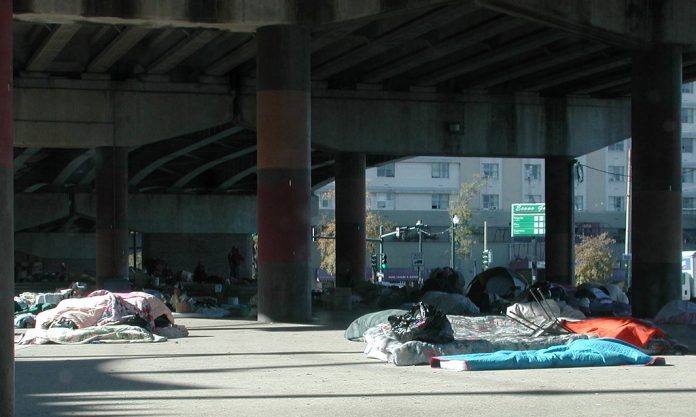Left painting murals of homelessness misinformation about innovative solutions, such as outlawing sidewalk camping. (Opinion)
By Stefani E. Buhajla
There is no denying that homelessness is a complex issue. There are compounding factors that can lead to a person finding themselves on the streets – making it difficult for them to get back on their feet.
Because of this complexity, there is no single solution for homelessness. Still, there are many ways our communities can help improve the lives of people on the street – and Cicero Institute advocates for those innovative solutions. Unfortunately, innovative solutions are often seen as a threat to those dedicated to protecting the status quo. In this case, that includes many working in the homelessness industry seeking to guard their turf.
Donald Whitehead is considered a leading expert on homelessness, so it was disappointing to see him use a national platform like Dr. Phil’s podcast to share some outright misinformation on Cicero-backed solutions in Missouri. He stated that Missouri had outlawed permanent supportive housing, which is simply not true – and never mind that the law he is presumably (falsely) referencing was struck down on a technicality.
Mr. Whitehead went on to characterize a section of the bill prohibiting unmonitored street camping as wanting to put people “on an island” while ignoring the reality that unauthorized camps are dangerous for the women and children living in them and lack hygiene facilities. Missourians know it isn’t compassionate to leave these people in vulnerable situations while the establishmentarians try to figure out how to build everyone a free house.
Mr. Whitehead paints murals of Cicero’s proposals with “myopic” and “quick fix” broad strokes, leaving the casual observer to wonder precisely what his contentions are. Anyone who has experience in mental health or substance abuse treatment knows recovery is not quick – no one is arguing otherwise. Treatment and recovery are complex processes that require bold solutions to help those who are suffering find employment, stable housing, and rebuild their lives. Unfortunately, when people need help the most, they are not always in a state of mind to know they need it and they may flatly refuse it. It’s a terrifying picture that depicts only a few morbid outcomes. This is something my own family has dealt with quite intimately.
Studies have found that unsheltered populations have high rates of addiction and mental illness, leaving them especially vulnerable to victimization, overdoses, or behavior that leads to arrest and incarceration. A study from the University of California at San Francisco found that 79% of homeless people have been incarcerated at some point in their lives, and at least one in five were released from prison or a prolonged jail term within the last six months. If courts could divert homeless individuals with minor criminal infractions into mental health or addiction treatment instead of jail, this could help them turn their lives around. And, with early intervention, those at high risk of homelessness might be altogether saved from that terrible fate.
Studies have found that mandatory mental health treatment can reduce criminal recidivism by as much as 36 percent. At the same time, locations focusing on failed Housing First programs with little to no accountability measures isolate and marginalize those who are most in need of mental health or substance abuse recovery programs. Recognizing this is far from “myopic.”
Throughout my career, I’ve worked on numerous initiatives with different policy organizations, charities, and other nonprofits to help provide opportunities for people who are homeless or living in poverty to flourish. Over and over, I see people like Mr. Whitehead who are focused on symptoms instead of real solutions. And over and over, I see them strike out in offense at those who want to try something new.
This is personal to me. I’ve lived in poverty. I know how important accountability and subsidiarity are to building a bright future. Those are fundamental tenets of the solutions we work on at Cicero.
Dr. Phil seems like a no-nonsense guy to me. I’ve seen him talk openly about the tragic addiction crisis happening in our country today and encourage people to seek help for their mental health – and he always advocates for accountability. If he – and his audience – were to have the opportunity to hear the truth, I think they just might like our ideas.
Stefani E. Buhajla is the director of communications for the Cicero Institute, a non-profit public policy organization founded by tech entrepreneur Joe Lonsdale. She has dedicated her 15-year public policy career to increasing economic opportunity for all Americans.
Originally published by The Center Square. Republished with permission.
For more Budget & Tax News.











